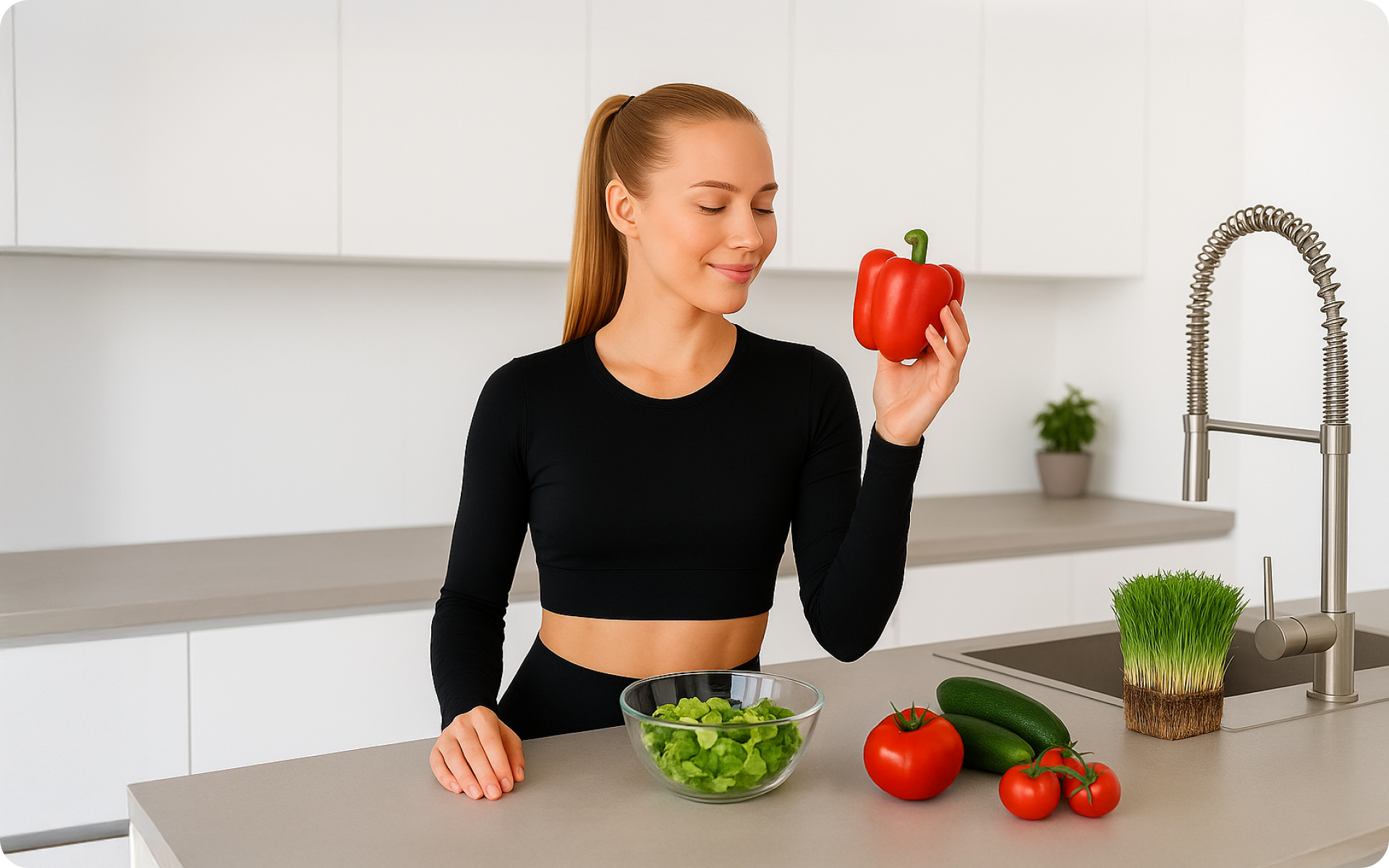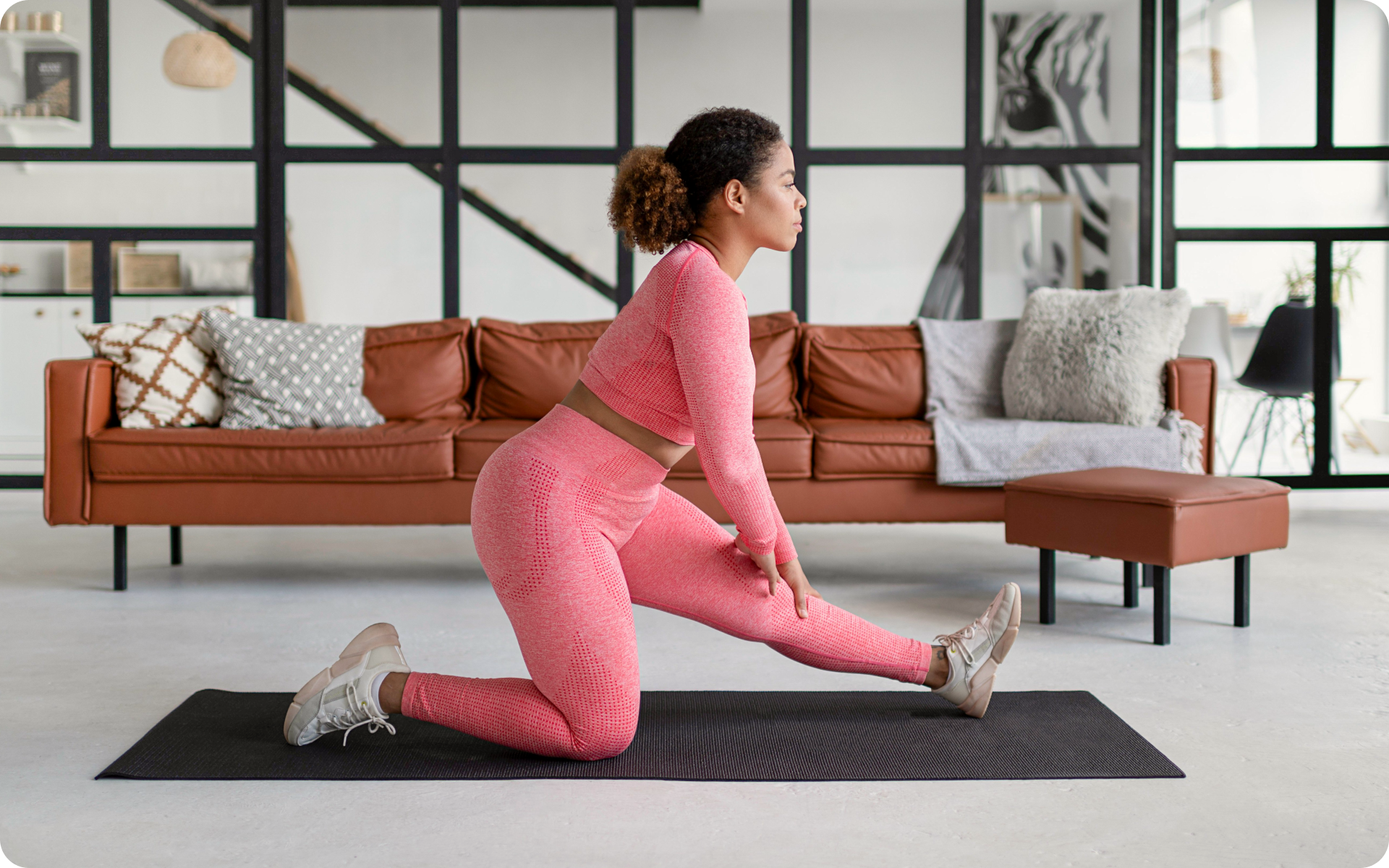Are you tired of feeling puffy and bloated like you’re carrying extra water weight? Water weight is like that. You put it on out of nowhere, and it will make you feel heavier than you actually are.
Waking up and checking your weight only to find that, surprisingly, you packed a few pounds overnight could be upsetting. But don’t worry, it is likely just water weight and not a dreaded fat mass!
Water weight is simply the accumulation of excess water in the body for various reasons. A human adult body consists of around 60% water (16). When the water exceeds the normal limit of the body, the excess is usually the water weight. You may notice this in the form of bloating or puffiness in your face, ankles, or feet.
Read along to discover its definition, causes, and, most importantly, how to lose water weight.
What is Water Weight?
Any water retained in the body beyond the natural amount is termed water retention and usually shows up as edema or swelling in some parts of the body. This is known as water weight (1).
Simply put, it includes the excess water the tissues hold up, causing bloating or puffiness and, ultimately, extra weight. Water is quite a heavy compound and considerable weight. So you will feel a bit heavy, and the scale will show a higher number, too.
Most people can get water retention overnight due to having a high-sodium meal. Water retention in legs is the most noticeable, and you can see swollen feet, calves, and ankles. Swollen eyes and face are also common signs of water weight. The water weight discussed here differs from the medical condition of chronic water retention that happens due to kidney-related and other chronic diseases.
BetterMe is your fast-track ticket to a long-lasting weight loss! Tailor your fitness journey and maximize your results with just a couple of swipes!
Why Am I Retaining Water Weight?
Factors contributing to weight gain, when the primary cause is water stored in tissues, is from a trigger to the water-holding response in the body. Some of the most common causes are as follows:
Inadequate Hydration
It seems quite like an oxymoron that water retention can be due to less water intake, but it is true that if the body is dehydrated, it will store more water. To avoid extreme conditions, it retains all the moisture it gets. Very little water and urine will be eliminated from the body in respiration or sweating (17).
Refined Carb Laden Foods
Carbs need water compounds to bind together for storage in the body, so consuming a higher amount of carbs could ultimately make you store more water. According to research, each gram of glycogen is stored in the body with more than 3 grams of water, so the more glycogen is stored, the more water can be retained (12).
High Sodium Intake
Sodium-rich foods are a leading cause of water weight as high sodium disturbs the body’s electrolyte balance, and to balance it out, the body starts retaining more water. This is to maintain the sodium-to-water ratio of the body. Most ultra-processed foods have high sodium levels, and hidden sodium can even be found in non-salty items to increase shelf life (14).
Furthermore, sodium attracts water, acts like a magnet for water, and decreases urine output due to reabsorption in the kidneys, this is essential to maintain the electrolyte balance as water dilutes the effects of sodium, so more water is retained by the body (8).
Hormonal Imbalances
Your body’s fluid levels can be affected if you battle hormonal changes. This can increase water retention. Whether the hormonal shift is due to stress, oral contraceptives, menstrual cycle, or pregnancy, female hormonal fluctuations can increase water retention (6).
Medical Conditions
A medical condition related to a heart, liver, or kidney disease can cause water retention due to poor circulation or improper elimination. These issues can cause the fluids to stay in the body longer and cause water weight. Also, some medications, such as those used for blood pressure chemotherapy, NSAIDs, antidepressants, or heart disease, have water retention as a side effect (19).
Electrolytes Imbalance
Suffering from mineral deficiencies and vitamin deficiencies directly correlates with water retention. Potassium, magnesium, and possibly vitamin B6 are essential for maintaining fluid levels and electrolyte composition.
Potassium is the counterbalance of sodium. It can help regulate the fluid and electrolyte balance (11). At the same time, magnesium is shown to reduce water retention, especially during the PMS symptoms (10).
Inactive Lifestyle
Remaining seated for prolonged durations causes the tissues to hold water, especially in the legs, increasing their water retention. Even standing for long periods can cause all the fluid to stay in your feet, hinder proper blood circulation, and lead to edema of the feet.
How to Lose Water Weight?
After reading all the potential causes of water retention, losing water weight becomes a no-brainer. You can simply lose water weight by avoiding the causes of water weight. This includes staying away from the list of foods that cause water retention and increasing food intake that may help excrete water.
The worst foods for water retention are high sodium, carb-laden foods. By avoiding foods that cause water retention and instead opting for foods that may help get rid of water, you can considerably lose water in 24 hours.
Any physical activity that leads to sweating can eventually reduce water weight as water is eliminated from sweat. Natural diuretics can also help wash out the excess fluids from the body. Including these in your daily diet will aid the body in expelling the excess water from the tissues.
Read more: The 28-Day Indoor Walking Weight Loss Challenge Explained
So, to answer how to lose water weight, some of the ways are discussed below:
Hydrate
As much as it sounds ridiculous that water retention can be reduced by increasing water intake, proper hydration will urge your body to remove excess water. As mentioned earlier, dehydration causes more water retention.
Thus, opt for hydrating foods like cucumber and watermelons to drain excess fluids from the tissues. As the sodium-to-water ratio is restored, kidneys remove fluid, so the water weight may drop considerably (17).
Reduce Sodium Intake
Mindfully eat foods low in sodium, and avoid table salt and highly processed foods, as sodium is a magnet to water. Sodium can elevate water retention, so be careful and read labels while preferably avoiding eating out (8). When sodium is within normal levels, the body eliminates water as it should (13).
Increase Potassium and Magnesium
Try to increase the consumption of potassium-rich foods such as bananas, avocados, and spinach. Typically, foods such as avocados, bananas, apples, and eggs are nutrient-rich, help increase potassium and magnesium, and by extension reduce water retention.
Potassium helps reduce the water weight by assisting the kidneys to excrete more water (11). Magnesium helps reduce water retention and puffiness from hormonal causes, especially those preceding a menstrual cycle (10).
Cut Back on Refined Carbs
Carbohydrates need more water molecules to bind to them for storage. As mentioned earlier, for 1 gram of glycogen, 3 grams of water is stored with it. Reducing carbohydrates can lead to less glycogen being held and less water weight being added.
So, opt for fiber-dense and protein-rich foods that help digestion and better water absorption in the gut while keeping the salt-water ratio in balance (9).
Move around More
Physical activity that causes sweating can release the water build-up from within the tissues. This may improve circulation, normalize blood flow, and aid fluids to drain properly. It might also help lymphatic drainage, further reducing fluids from accumulating within.
Not only does working out make you sweat, but it also reduces inflammation, which eventually reduces water retention. Also, working out burns the stored glycogen, releasing water bound to it and further decreasing water weight (16).
Add Natural Diuretics to Your Diet
Some foods are natural diuretics, meaning they cause the body to release water in the form of extra urination. Medicines such as water pills are also taken to relieve water retention issues.
According to some animal research, watermelons may have natural diuretic properties that can remove excess fluid (18). Other potential natural diuretics are dandelion, parsley, ginger, fennel, nettle, hibiscus, and hawthorn, which can be taken as a supplement or tea (3). Talk to your doctor about any supplements or herbal teas if you have any medical conditions or are taking any medications.
Improve Sleeping pattern
Sleeping helps normalize many processes within the body and repair mechanisms to kick in, which helps in reducing inflammation and water retention.
Follow these dietary and lifestyle changes and you should notice a gradual reduction in your water weight. Apart from these, side effects of medications should also be looked into as they may be the reasons behind water retention.
How Long Can It Take to Lose Water Weight?
The time it takes to lose water weight depends on the cause of the fluid retention and how severe it is, as well as other individual factors. If you just ate a salty meal and feel a little bloated the next day, taking the above steps should resolve the problem within a day or so. Bloating due to hormonal fluctuations may take a few days. Chronic fluid retention due to a medical problem or medication side effect may be difficult and take time to reduce.
If you’ve mustered up the courage to crush your weight loss goal, let Betterme take the sting out of this demanding process. Our app will help you restructure your habits, remold your life and crank up your fitness results!
How to Lose Water Weight in 3 Days?
Losing any weight in just three days is not recommended and is unsafe. This is a challenging task to undertake. To lose water weight within three days you need to be extremely vigilant in what you eat.
Practice portion control and eat mostly potassium and magnesium-rich foods. Avoid any high sodium or carbohydrate-laden foods. Also, drink more than 2.5 liters of water to help eliminate excess water and flush out toxins and sodium.
You can also take multivitamins and supplements, especially natural diuretics, to expel the retained water rapidly, just be sure to speak to your healthcare provider about that first. Indulge in hydrating foods like watermelon, cucumbers, and lemon.
Boost physical activity in general and include at least an hour of exercise daily, whether walking or any other cardio exercise. This will help draw out water from tissues via sweating.
Following these guidelines can hopefully help you lose some water weight in three days!
Read more: Vegan Weight Loss Meal Plan and Prep Tips
FAQs
How much weight will I lose on a 3-day water fast?
A water fast is when nothing is taken except water for prolonged durations. The amount of weight lost will vary by individual, but it should not be considered safe or sustainable weight loss.
What does water weight look like?
Appearance of water weight is seen as swelling, Puffiness, or edema anywhere in the body, like in the joints, lower extremities, and face. Swollen eyes, bloated stomach, swollen hands, fingers, or legs signify water weight. This can be seen in the form of unexplained weight gain as well.
Is the first 10 lbs water weight?
When you start working out or dieting to lose weight, you tend to lose a lot of weight rapidly in the first few days. That weight is usually mostly water weight, so it is quite true that the initial 10 pounds or so could be water weight, depending on the person. When glycogen starts burning, you lose water weight as per each gram of glycogen, 3 grams of water weight is lost (5).
What foods get rid of water weight?
Foods that are enriched with potassium may help you to eliminate water weight. Potassium can regulate fluid balance in the body and reduce retention. These foods include bananas, avocados, kale, spinach, and mushrooms.
The Bottom Line
Water weight is not actually fat gain. It is just the excess water retained in the body for several reasons. Leading causes of this could be high sodium, refined carb-laden foods, and dehydration.
An inactive lifestyle with poor nutrition and a sedentary lifestyle coupled with stress and sleep deprivation may aggravate water retention. Some medicines and chronic diseases also cause fluid retention. It causes bloating, weight gain, swelling of extremities with puffiness, and uncomfortable tightness. These symptoms can be relieved by undoing its causes, which are better hydration, eating nutritious food, increasing potassium and magnesium intake while reducing sodium and refined carbohydrates, and adopting an active lifestyle.
Engaging in activities that draw out fluids in the form of sweat and taking natural diuretics to increase water excretion via urine can also help lose weight. While doing this, take care and consult a medical practitioner as to what is best suited for your requirements.
DISCLAIMER:
This article is intended for general informational purposes only and does not serve to address individual circumstances. It is not a substitute for professional advice or help and should not be relied on for making any kind of decision-making. Any action taken as a direct or indirect result of the information in this article is entirely at your own risk and is your sole responsibility.
BetterMe, its content staff, and its medical advisors accept no responsibility for inaccuracies, errors, misstatements, inconsistencies, or omissions and specifically disclaim any liability, loss or risk, personal, professional or otherwise, which may be incurred as a consequence, directly or indirectly, of the use and/or application of any content.
You should always seek the advice of your physician or other qualified health provider with any questions you may have regarding a medical condition or your specific situation. Never disregard professional medical advice or delay seeking it because of BetterMe content. If you suspect or think you may have a medical emergency, call your doctor.
SOURCES
- 6 Ways to Reduce Water Retention (Edema) (2023, healthline.com)
- Adrenal Hormones (2022, endocrine.org)
- Can natural diuretics reduce fluid retention and help with weight loss? (n.d., mayoclinic.org)
- Efficacy and safety of prolonged water fasting: a narrative review of human trials (2023, academic.oup.com)
- Getting past a weight-loss plateau (n.d., mayoclinic.org)
- Hormonal Changes During Menopause and the Impact on Fluid Regulation (2014, ncbi.nlm.nih.gov)
- How to Treat Stomach Bloating and Water Retention (2019, livestrong.com)
- Increased salt consumption induces body water conservation and decreases fluid intake (2017, jci.org)
- Insulin: Trigger and Target of Renal Functions (2020, frontiersin.org)
- Magnesium in the gynecological practice: a literature review (2017, pubmed.ncbi.nlm.nih.gov)
- Potassium Fact Sheet for Health Professionals (n.d., ods.od.nih.gov)
- Relationship between muscle water and glycogen recovery after prolonged exercise in the heat in humans (2015, pubmed.ncbi.nlm.nih.gov)
- Salt and water: not so simple (2017, pubmed.ncbi.nlm.nih.gov)
- Sodium Intake and Health (n.d., cdc.gov)
- The Effects of Prolonged Water-Only Fasting and Refeeding on Markers of Cardiometabolic Risk (2022, ncbi.nlm.nih.gov)
- Water Weight: What it is, causes, and how to lose it (2023, medicalnewstoday.com)
- What’s Water Weight? (n.d., webmd.com)
- What are the health benefits of watermelon? (2023, medicalnewstoday.com)
- Why Am I Retaining Water? (2022, webmd.com)













